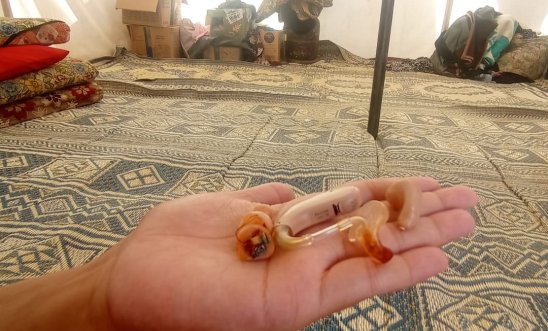
Life in War - The Silent Genocide

Life in War - The Silent Genocide
By Areej Alghazzawi
What can I say about my exceptional friend Kawthar Afana? I met her at the central UN warehouses seven months ago in Rafah - Tal Al-Sultan. She's so kind and beautiful, with hazel eyes that look like the evening sun. She's been forced to flee from one unsafe area to the next unsafe area in Gaza too many times since October 2023. Most recently, she fled from Rafah to Khan Younis, trying her best to avoid Israeli airstrikes. Unlike me, she didn't have the added advantage of hearing the drones and jets that had long replaced the sounds of birds and laughter. Maybe her deafness is actually a blessing? Genocide has a unique sound that scars the heart. How I wish to never hear our people's screams again.
Her parents didn't spot her deafness when she first started speaking. She'd pronounce words incorrectly and often sounded confused. Her parents initially thought she'd learn to speak correctly as she grew older.
One of her uncles notified her parents about the possibility of deafness. It hadn't occurred to them because nobody in the family was deaf. They took her to be diagnosed at the Atfaluna Society for Deaf Children.
Kawthar told me, "The first time I wore a hearing aid was overwhelming. I could hear people breathing everywhere and all the time. The sounds around me were suffocating and caused a headache that felt like it would never end. I didn't want to wear the hearing aid, preferring to struggle, at least without my head being squeezed like a lemon".
But Gaza was no place for a deaf person - the infrastructure and adjustments across society were just not there for young Kawther. In 2001, she started taking speech therapy lessons three times a week for five years when she was seven. This was a vital, if expensive, resource to help her integrate into and navigate wider society.
She said: "I worked hard on myself since I was young. Not all my classmates understood my deafness, and some would tease me. The teachers also lacked understanding and training in how to manage me. Some would ignore me to ensure they got through their lesson plan without me slowing everyone down. School was so important to me. Even though I didn't pass my regular exams, it gave me some structure".
Since then, she has taken courses with the Deaf Society in catering, embroidery, and sign language. This last course was supposed to be completed after October 7.
Like all of us, Kawthar's life has turned upside down since that fateful day last October. Her family tried to escape the bombs, but, like most of us, they were not lucky. In her area, 50 people were killed early on, including a member of her family.
On the night of that massacre, she'd told her cousin, Rasha, about a weird feeling she had. "I told her that something is about to happen here." She said she removed her hearing aid and placed it under her pillow. The silence created a stillness and helped her sleep. She awoke to broken glass and rubble smashing into her face and her blood trembling like it was trying to break out of her veins. She hadn't heard the missiles or the explosion but felt their impact. "It was dark and terrifying. When I eventually found my hearing aid, I realised it was broken. I felt sick at the prospect of inescapable silence".
"When the dust settled, it looked like everyone was laughing. Was this a surreal nightmare? In reality, everyone was crying. My cousin's son, Fo'ad, a lovely 4-year-old boy, had been killed instantly in the Israeli attack. The next day, in despair, we packed up what we could take from beneath the rubble and fled to the central warehouses of the UN in Rafah, which were supposed to be a safe place. This is what we were told, but this was another lie."
It's been over a year of Israel's genocide against us. The schools are gone. Israel bombed them. The support deaf people need is limited or non-existent, and Israel's cruel blockade stops us from receiving what we need to survive. Kawthar eventually got a new hearing aid and does her best to keep it safe. Living through a genocide is unbearable - doing so whilst deaf is becoming impossible. Now I see the sun going down in Kawthar's eyes. She told me her only dream is to hear the sound of people breathing peacefully.
Areej Alghazzawi is a junior accountancy student at the Islamic University of Gaza. She hopes to become a teacher and an accountant. She had one year left of her studies before Israel's attack put her hopes on hold.
She is currently displaced in Khan Younis and, along with her family members, struggling every day to survive.
Our blogs are written by Amnesty International staff, volunteers and other interested individuals, to encourage debate around human rights issues. They do not necessarily represent the views of Amnesty International.
0 comments